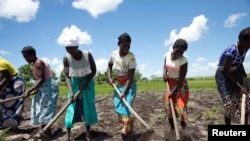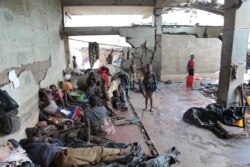United Nations agencies report Mozambique is still struggling to recover from last year’s devastating Cyclone Idai, which triggered a humanitarian crisis that persists to this day.
Cyclone Idai, one of the worst tropical storms to affect Africa, struck Central Mozambique one year ago, killing more than 1,300 and rendering hundreds of thousands homeless. It caused widespread destruction of infrastructure and wiped out the livelihoods of millions of people.
Survivors are having a tough time getting back on their feet.
The United Nations reports 2.5 million people, half of them children, are in need of humanitarian assistance to survive.
The World Food Program reports communities in the south of the country are suffering from severe food shortages because of prolonged drought. Moreover, it says conditions are worsening for a growing number displaced by intensified jihadist violence in the north.
WFP spokeswoman Elizabeth Byrs told VOA her agency does not have the money to carry out essential reconstruction. She said last month WFP was forced to cut food rations in half for more than half a million people working on Idai recovery projects.
“This month, in March, we had to stop, to halt completely the rations. That is why we are concerned with the funding situation, because we cannot help those small farmers who have lost their crops and who cannot plant anymore. So, they need this work and food for work assistance to survive,” said Byrs.
WFP is appealing for $91 million to implement planned rehabilitation projects for Idai survivors this year. Money also is urgently needed to address growing malnutrition.
UNICEF reports chronic malnutrition afflicts 43% of children under 5, one of the highest rates in the world. Additionally, it says more than 3,000 children under 5 have been diagnosed with life-threatening severe acute malnutrition after harvests were washed away by floodwaters.
WFP says children are not getting enough to eat and lack the nutrients to keep them healthy. It says a serious manifestation of this is a rare outbreak of pellagra, a disease triggered by vitamin B3 deficiency.
It says nearly 4,000 people, many of them children, are affected by this disease which causes diarrhea, dermatitis, and dementia, and is fatal if untreated.





